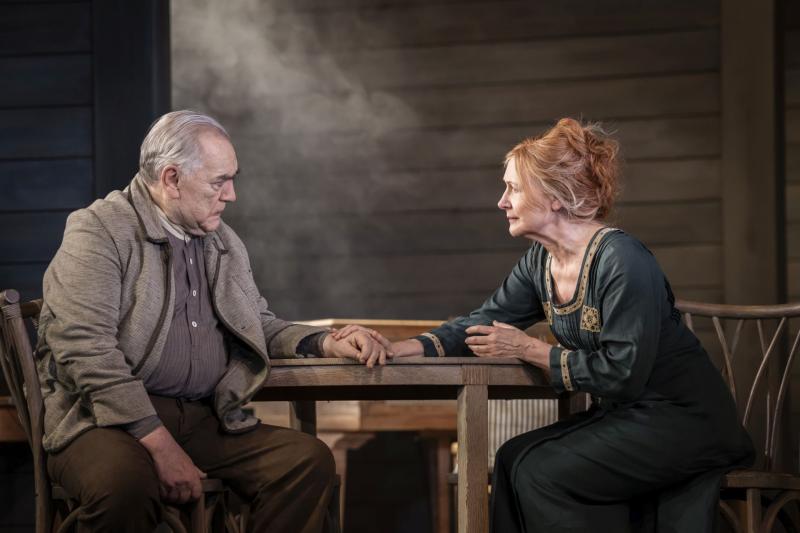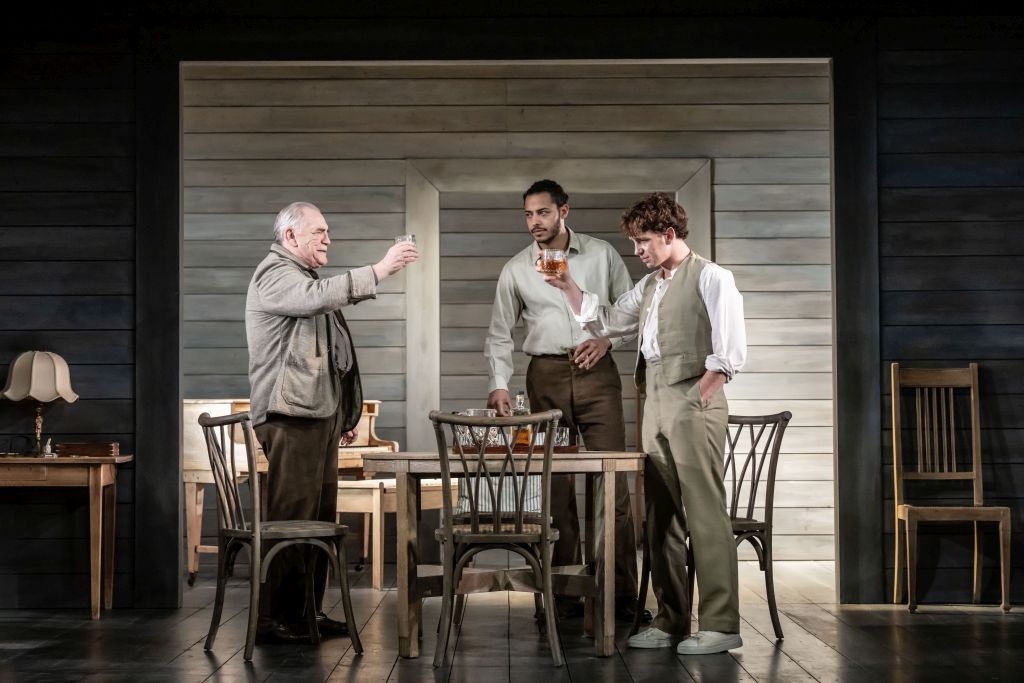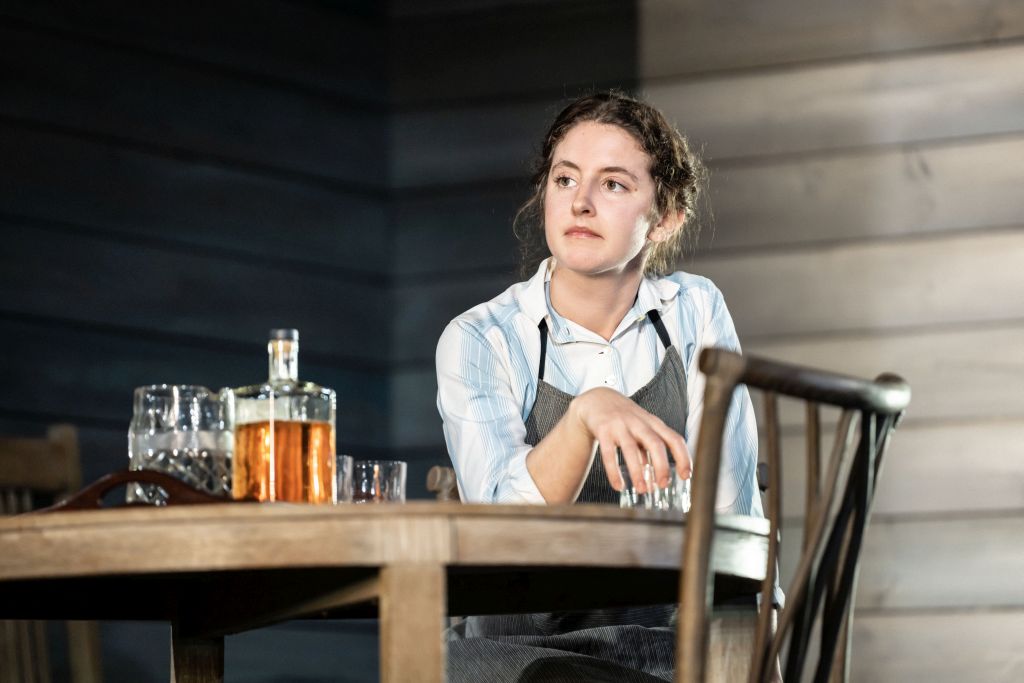Long Day's Journey Into Night, Wyndham's Theatre review - O'Neill masterwork is once again driven by its Mary | reviews, news & interviews
Long Day's Journey Into Night, Wyndham's Theatre review - O'Neill masterwork is once again driven by its Mary
Long Day's Journey Into Night, Wyndham's Theatre review - O'Neill masterwork is once again driven by its Mary
Patricia Clarkson powers the latest iteration of this great, grievous American drama

Memory is a confounding thing. By way of proof, just ask the Mary Tyrone who is being given unforgettable life by Patricia Clarkson in London's latest version of Long Day's Journey into Night, which has arrived on the West End (and at the same theatre) a mere six years after the previous version of Eugene O'Neill's posthumously premiered masterwork; that one headlined a top-rank Lesley Manville in the same part.
Arthritic and lonely, Mary looks towards a past where she was "so happy, for a time", away from the crushing realities of the present. Those include a consumptive young son, Edmund (Laurie Kynaston), bound for a sanatorium, and a husband of 35 years, James (Brian Cox, pictured below, left), whose miserliness has inflicted incalculable damage.
But such mental vagaries at the same time recall the son, Eugene, whom Mary long ago lost and the blame and shame that go with that, and the religiosity she once held dear that has been replaced by a testosterone-charged household given over to drink. No wonder the play finds Mary on the morphine-addicted edge, over which, at its harrowing finish, she seems rrevocably to have fallen.  O'Neill said of his play that it was "written in tears and blood", and the title rests high atop many shortlists of the greatest American plays, and certainly the saddest. Jeremy Herrin's slow-aborning if properly sorrowful production confirms a sense confirmed by experience that this text really does belong to Mary. Cox may be the name draw to a local audience keen to see the Scottish star of Succession back on the West End for the first time since The Weir, again at this same theatre.
O'Neill said of his play that it was "written in tears and blood", and the title rests high atop many shortlists of the greatest American plays, and certainly the saddest. Jeremy Herrin's slow-aborning if properly sorrowful production confirms a sense confirmed by experience that this text really does belong to Mary. Cox may be the name draw to a local audience keen to see the Scottish star of Succession back on the West End for the first time since The Weir, again at this same theatre.
But once again, one is aware of the wounded Mary dominating even in her absence, as she draws the men in her orbit near in order to continually catch them offguard.
Which Mary will her husband and sons find the next time she enters the sparsely furnished wooden living room, itself austerely designed by Lizzie Clachan so as to connect up visually with the recesses of the mind? (In other contexts, it would make a good sauna.) It's impossible to predict, but Clarkson is in command of this difficult role from first to last, her final moments bringing her the very lip of the stage as if to impress the urgency of her situation directly upon the audience. The fourth wall is shattered, as is Mary's mind.
At first, Clarkson's voice seems oddly flat, but you soon clock her vocal timbre as a defense mechanism to keep too much emotion from seeping through too quickly. Whereas the great Jessica Lange, a Tony winner for this same part several years ago on Broadway, was more overtly musical in her delivery, and more cajoling, Clarkson gradually lays bare the psychic abyss that Mary inhabits and the gathering mixture of truths and falsehoods that she has made of her current half-life.
Stricken by thoughts of a tubercular father and a younger son, Edmund, who says famously of himself that he is "a little bit in love with death", Mary finds company of sorts in the family maid Cathleen, whom Louisa Harland (pictured below) plays with unusual vigour: her own fondness for drink is clearly of a piece with that of her employers. But you all the while clock in Mary a deep love for her abject husband that is at the same time tempered by anxiety and perhaps even anger; her mood swings, one senses, are in their own way all about control.
 The volatile Tyrone is the showier role, as you would expect of a onetime matinee idol who has had a barnstorming success on the stage that can't equate to early appraisals in his career as a first-rate Othello. Needling and bad-tempered, Tyrone has an opinion on everything (Ibsen really gets it) – his wife's full figure included – and his own means of control has to do with lessening the wattage in the room: cue not one but two instances where Cox must mount a table to tend to some bulbs overhead, Kynaston's watchful Edmund on hand to assist.
The volatile Tyrone is the showier role, as you would expect of a onetime matinee idol who has had a barnstorming success on the stage that can't equate to early appraisals in his career as a first-rate Othello. Needling and bad-tempered, Tyrone has an opinion on everything (Ibsen really gets it) – his wife's full figure included – and his own means of control has to do with lessening the wattage in the room: cue not one but two instances where Cox must mount a table to tend to some bulbs overhead, Kynaston's watchful Edmund on hand to assist.
I've always had a particular fondness for the great scene late on where the parents vacate the stage and leave the two boys, Jamie and Edmund, to have at one another and excavate more home truths in the process. (Seared on my memory forever are Peter Gallagher and Kevin Spacey in these roles nearly 40 years ago.)
Kynaston and, especially, McCormack do that encounter proud, the latter propelled by booze to confess an inner malignancy accompanying a son more or less dismissed by his own father as a whoremongering barfly: you sense in the excellent McCormack a rage that hasn't found rest. Edmund is the sensitive soul who can quote Baudelaire, but Kynaston communicates a keen-eyed awareness in step with an assemblage for whom lacerations are the collective lingua franca. Interestingly, two actors were previously cast in this part in this production, both of whom stepped away, but there's no sense whatsoever of Kynaston as a late arrival.
Still, I'm with James and Jamie and Edmund in awaiting every footstep of Mary, whether she is actually in the room or lowering overhead, unseen, within the claustrophobic Monte Cristo Cottage in Connecticut where this Nobel laureate's play is set. (The home is referenced in the text as "this shabby place".) And as the day turns to night and the characters' demons emerge, you're once again reminded of the formidable power of this woman at her most fragile: the tyranny of the weak restored once more to tremulous life.
The future of Arts Journalism
You can stop theartsdesk.com closing!
We urgently need financing to survive. Our fundraising drive has thus far raised £49,000 but we need to reach £100,000 or we will be forced to close. Please contribute here: https://gofund.me/c3f6033d
And if you can forward this information to anyone who might assist, we’d be grateful.

Subscribe to theartsdesk.com
Thank you for continuing to read our work on theartsdesk.com. For unlimited access to every article in its entirety, including our archive of more than 15,000 pieces, we're asking for £5 per month or £40 per year. We feel it's a very good deal, and hope you do too.
To take a subscription now simply click here.
And if you're looking for that extra gift for a friend or family member, why not treat them to a theartsdesk.com gift subscription?
more Theatre
 Hedda, Orange Tree Theatre review - a monument reimagined, perhaps even improved
Scandinavian masterpiece transplanted into a London reeling from the ravages of war
Hedda, Orange Tree Theatre review - a monument reimagined, perhaps even improved
Scandinavian masterpiece transplanted into a London reeling from the ravages of war
 The Assembled Parties, Hampstead review - a rarity, a well-made play delivered straight
Witty but poignant tribute to the strength of family ties as all around disintegrates
The Assembled Parties, Hampstead review - a rarity, a well-made play delivered straight
Witty but poignant tribute to the strength of family ties as all around disintegrates
 Mary Page Marlowe, Old Vic review - a starry portrait of a splintered life
Tracy Letts's Off Broadway play makes a shimmeringly powerful London debut
Mary Page Marlowe, Old Vic review - a starry portrait of a splintered life
Tracy Letts's Off Broadway play makes a shimmeringly powerful London debut
 Little Brother, Soho Theatre review - light, bright but emotionally true
This Verity Bargate Award-winning dramedy is entertaining as well as thought provoking
Little Brother, Soho Theatre review - light, bright but emotionally true
This Verity Bargate Award-winning dramedy is entertaining as well as thought provoking
 The Unbelievers, Royal Court Theatre - grimly compelling, powerfully performed
Nick Payne's new play is amongst his best
The Unbelievers, Royal Court Theatre - grimly compelling, powerfully performed
Nick Payne's new play is amongst his best
 The Maids, Donmar Warehouse review - vibrant cast lost in a spectacular-looking fever dream
Kip Williams revises Genet, with little gained in the update except eye-popping visuals
The Maids, Donmar Warehouse review - vibrant cast lost in a spectacular-looking fever dream
Kip Williams revises Genet, with little gained in the update except eye-popping visuals
 Ragdoll, Jermyn Street Theatre review - compelling and emotionally truthful
Katherine Moar returns with a Patty Hearst-inspired follow up to her debut hit 'Farm Hall'
Ragdoll, Jermyn Street Theatre review - compelling and emotionally truthful
Katherine Moar returns with a Patty Hearst-inspired follow up to her debut hit 'Farm Hall'
 Troilus and Cressida, Globe Theatre review - a 'problem play' with added problems
Raucous and carnivalesque, but also ugly and incomprehensible
Troilus and Cressida, Globe Theatre review - a 'problem play' with added problems
Raucous and carnivalesque, but also ugly and incomprehensible
 Clarkston, Trafalgar Theatre review - two lads on a road to nowhere
Netflix star, Joe Locke, is the selling point of a production that needs one
Clarkston, Trafalgar Theatre review - two lads on a road to nowhere
Netflix star, Joe Locke, is the selling point of a production that needs one
 Ghost Stories, Peacock Theatre review - spirited staging but short on scares
Impressive spectacle saves an ageing show in an unsuitable venue
Ghost Stories, Peacock Theatre review - spirited staging but short on scares
Impressive spectacle saves an ageing show in an unsuitable venue
 Hamlet, National Theatre review - turning tragedy to comedy is no joke
Hiran Abeyeskera’s childlike prince falls flat in a mixed production
Hamlet, National Theatre review - turning tragedy to comedy is no joke
Hiran Abeyeskera’s childlike prince falls flat in a mixed production
 Rohtko, Barbican review - postmodern meditation on fake and authentic art is less than the sum of its parts
Łukasz Twarkowski's production dazzles without illuminating
Rohtko, Barbican review - postmodern meditation on fake and authentic art is less than the sum of its parts
Łukasz Twarkowski's production dazzles without illuminating

Add comment